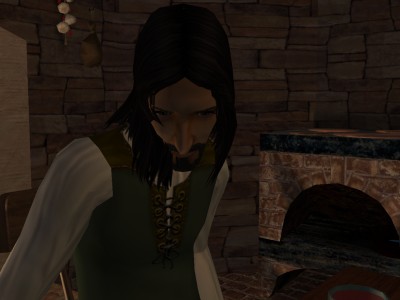
Dining with the elf was more awkward than Egelric had feared.
He remained scrupulously polite, again revealing that, while he had learned men’s manners at table, he had never yet put them to use. He tolerated Sela’s presence beside him, but he never looked at her, and she kept her eyes down through the entire meal.
Meanwhile Alred was even less communicative than he had lately been, for he seemed to think that Egelric and Ears could keep up the conversation between the two of them. In truth, Egelric bore the brunt of it. Even the elf spoke little unless spoken to.
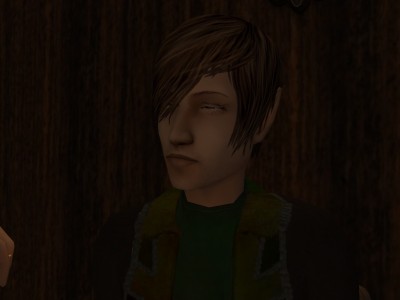
He was grateful when the wine began to take effect and they all began to relax. Sela, who did not drink, fled to the bedroom to be with the babies as soon as she could, and that was when the elf truly regained his good humor.
“I have never understood the purpose of butter until now,” he sighed contentedly as he finished the last of many slices of bread.
“Don’t the elves make butter?” Egelric asked him.

“How should we get the milk? We don’t have cows. When I was young,” he giggled, “we stole a crock of butter once, my cousins and I, and when we tasted it we were certain that we had been mistaken and that it was meant for greasing your wagon wheels or something similar. We didn’t know about the bread.”
“Ah!” Alred cried, and he wore a weary little smile. “So all of the times that cake disappeared from my pantry and my son told me that it must have been the elves who took it—perhaps it was?”

“Not from your castle, I don’t think, unless my cousins are bolder than I know. We only stole from the farms, where it was easier. And we didn’t do it often!” he added hurriedly. “But we were not allowed to taste your food, and so, of course, we were all dying to taste it,” he grinned.
“It would seem that boys are boys, even when they have pointed ears,” Egelric observed. “I stole many a pie in my day, left out to cool.”
“I liked the cheese the best,” Ears sighed nostalgically. “The great, hard cheeses. One can take such cheese far. And it’s salty!”

“I did notice you like salt,” Egelric said.
“And cheese,” Alred said.
“And wine,” Egelric grinned. “I knew you would be back for the wine. Better than cider, isn’t it?”
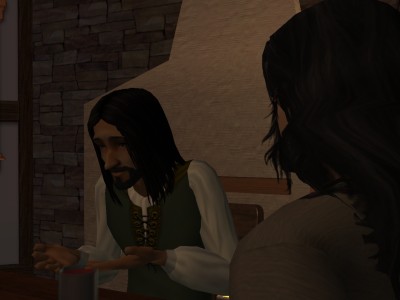
The elf wrinkled his nose. “I like the cider better. And one can drink more of it, I think. Now I feel as if I am growing…”
“Silly?”
“I’m afraid I shall tell you something I shouldn’t.”
“In vino veritas,” Alred muttered to himself.

Ears turned to him. “It is Latin.”
“Yes,” Alred said, looking up in his surprise.
“You write your books in Latin, but I have never heard it spoken outside of your church.”
“It is not spoken, except in the church, and among people who do not speak the same language. It is a shame, as it is a very elegant language. But I like English better for poetry.”

“Why?”
“Hmm. I suppose it is because Latin is for people who do not speak the same language. When two people do, it is better to speak directly. Then the words go to the heart and not only to the mind. And English has a bold rhythm for songs. Do the elves write poetry?”
“We don’t write it. I have never understood why men write their stories and poems in books. It must mean that it is complete, and can never be improved or amended. It is a dead poem then. How do you ever know when it is done?”
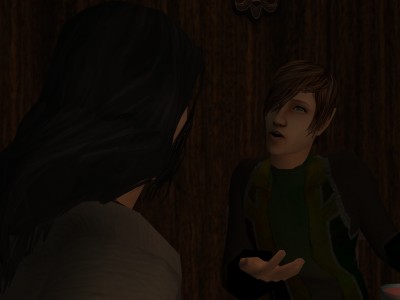
“It is an excellent question,” Alred said thoughtfully and rubbed his scruffy beard.
“I shouldn’t say I don’t understand why. I certainly don’t understand how they do it, but I see why. And I am grateful they do, for otherwise I could never have learned your stories and poems. The poem is dead, but when the poet is dead, too, something remains.”
“Have you learned our stories and poems?” Egelric asked.
“We have all of the books that belonged to your Baron’s grandfather’s grandfather.”
“You do?” Alred asked. Egelric was stunned to see him almost eager. “What books? By whom?”

“Oh—I believe I’m telling you something I shouldn’t.”
“We shan’t tell your father,” Egelric said.
“Oh… my father…” he winced.
“Religious books?” Alred asked. “Or others?”
Egelric slyly refilled the elf’s cup meanwhile.
Ears squinted thoughtfully. “Some of them tell of your dreadful One God who makes you do strange things to prove you love him. And the others tell of your dreadful many gods who drink and fight and play like men. And some of them don’t have any gods at all, but are only bloody stories about dreadful men who travel far only to kill each other.”

“What, oh, what must you think of us men?” Alred smiled faintly.
“If I only had your books, I would think you dreadful. My father and his generation do, for the books were all they knew. But I have seen how you live, and I find that you do not live as in any of the books. You are far more peaceable and dull. And your One God holds himself apart from the world, and no longer makes the sun stand still or wheels of fire appear in the sky—if he ever did. And your many gods are dead.”
“Men still travel far to kill one another,” Egelric said.

“Then they are dreadful.”
“Don’t you have any love poetry in amongst the killing?” Alred asked wistfully.
“Oh, of course. I like those very much. You have such different ways to say those things, such as an elf would never find to say.”
“And yet you think we men do not know what love is?” Egelric asked.
“‘Nunc scio quid sit amor’—‘Now I know what love is’—so one of your writing men said. I never said you didn’t know what love is. Only that you don’t know what it means to be unable to live without the one you love.”

Egelric cast an alarmed glance at Alred. Ears saw it and paled.
“Don’t look at me like that, Egelric,” Alred said hoarsely. “I am his proof, am I not? I am still alive.”
“I didn’t mean that,” Ears said softly. “That wasn’t what I meant.”

“It is nothing. Don’t trouble yourselves with me.”
“Perhaps I should go…” Ears said with an apologetic glance at Egelric.
“Not on my account,” Alred said. “I might go lie down a while and leave you two scholars to your debate.”
“Not on my account,” Ears said. “I mustn’t stay long, and shouldn’t be here at all, as I always say. But I didn’t come for the wine, Egelric. I wanted to give you something.”
“Something for me?” Egelric laughed, pleased that the subject had been so easily changed. “Shall I do as Baby does and try to guess? Let me see… is it something to wear?”
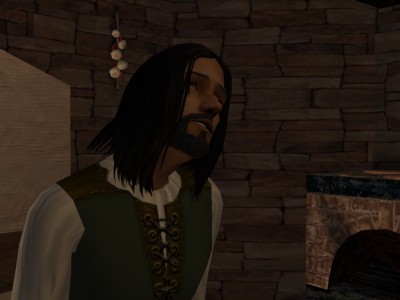
“It is.”
“Oh! That was too easy. It must be a new dress!”
“Is that what she likes?” the elf smiled.
“She does like pretty dresses. But she would sooner be caught dead than caught talking about dresses.”
Egelric suddenly realized he was sharing a complicit smile with the elf and looked away in consternation.
“It isn’t a dress,” the elf said quickly. “I’m sorry to disappoint you, for I’m certain you would be lovely in a pretty new dress. It is this.”
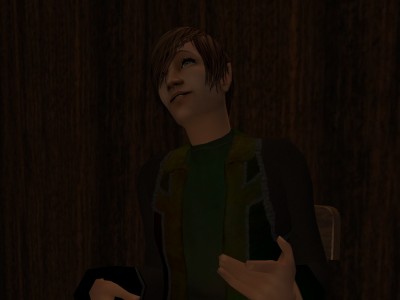
He searched in a pocket of his coat and tossed down a small piece of jewelry that hung from a thin loop of dark leather braid. It landed with a faint click on the table.
It was but a triangle of bone, crudely carved with parallel lines around the edge. Such simple ornaments were made in the time of the pagan ancestors, but this bone was white and new. Surely, Egelric thought, the elves who wore such fine clothing were capable of finer jewelry.
“Your son made it,” Ears said.
Egelric shuddered and clapped his hand over it.
“He didn’t think it fine enough and threw it away. I thought you might like to have it anyway.”
Egelric lifted his hand from it slowly. It was but a triangle of bone, crudely carved with parallel lines around the edge. To him it was as fair as Gunnilda’s rubies.
“I thank you. Dare I wear it?” he asked.

“You might wear it under your shirt,” he shrugged. “I wouldn’t flaunt it before the elves. It is from the shoulder of an old wolf that he loved.”
“Ah! My son loves wolves, and you love dogs.”
The elf laughed. “He must take after his father. You are the one who named your son Wulf.”
“And you are the one who will name your son—what was it?”
“Kílós?” he grinned. “It means ‘dog,’” he explained to Alred. “If I meant to have more than one, I might, only to please you.”
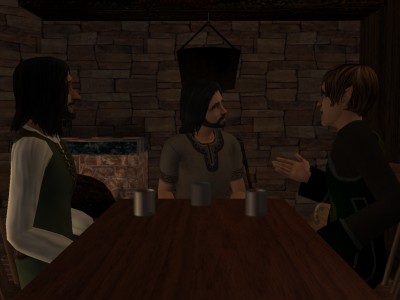
“If you want to please me then I suggest you name him Egelric. Then I shall know you love me, and not my dog.”
“We shall see how well I love you in five or ten years, when I have my son.”
“It’s a shame for Belsar. I doubt he will live so long. The devil!” he laughed. “Who am I to think I shall?”
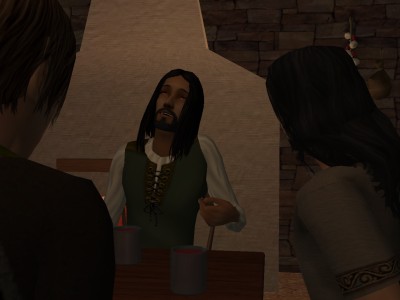
“I hope you will live at least that long,” the elf said as he rose.
“We shall drink to that before you go,” Alred said and lifted his cup. Egelric was surprised to see that he had been following the conversation after all.
“I suppose it would be discourteous to refuse,” the elf sighed.
“Gravely.”
They drank, and Egelric and Alred followed Ears to the door.
“One thing, before you go, if you please,” Alred said softly before the elf had quite gone out. “Who wrote ‘Nunc scio quid sit amor’?”
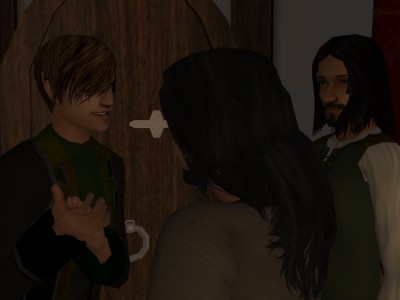
“If I tell you, you will think I have all of your books in my head,” he smiled. “I only remember that because I read it recently and I liked… let us say the sound of it. It was a writing man named Virgil. Do you know of him?”
“Ah! Virgil. I do, but I do not believe I have read that line.”
“I’m sorry I don’t remember what came before. Or after.”
“I only wished to know the author. What came before is not important,” Alred bowed. “What comes after is nothing.”
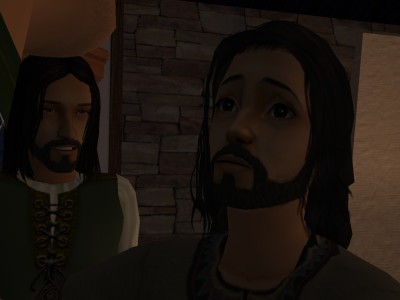









Look, a virgin post!
Lothere, what is that tan thing above Egelric's head in that last picture?